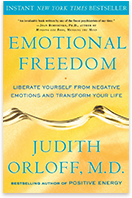Are you an empath? Take the test here to determine your empath score.
 In my book “EMOTIONAL FREEDOM” I emphasize the importance of forgiveness and why revenge doesn’t work. Forgiveness is the act of compassionately releasing the desire to punish someone or yourself for an offense. It’s a state of grace, nothing you can force or pretend. There are no short cuts. Mistakenly, some of my patients, wanting to be “spiritual,” have prematurely tried to forgive after someone emotionally knifes them in the gut. First, you must feel anger before you can begin to forgive. I gradually guide patients to the large-heartedness of forgiving injuries either caused by others or self-inflicted.
In my book “EMOTIONAL FREEDOM” I emphasize the importance of forgiveness and why revenge doesn’t work. Forgiveness is the act of compassionately releasing the desire to punish someone or yourself for an offense. It’s a state of grace, nothing you can force or pretend. There are no short cuts. Mistakenly, some of my patients, wanting to be “spiritual,” have prematurely tried to forgive after someone emotionally knifes them in the gut. First, you must feel anger before you can begin to forgive. I gradually guide patients to the large-heartedness of forgiving injuries either caused by others or self-inflicted.
Revenge is the desire to get even when someone does you wrong. It’s natural to feel angry, to say “I’m not going to let that **** get away with this,” whatever “this” is. However, revenge reduces you to your worst self, puts you on the same level with those spiteful people we claim to abhor. Additionally, studies have shown that revenge increases stress and impairs health and immunity. Sure, if someone hits you with a stick, you have the impulse to hit them back–the basis for wars. To thrive personally and as a species, we must resist this predictable lust for revenge, and seek to right wrongs more positively. This doesn’t make you a pushover; you’re just refusing to act in a tediously destructive way antithetical to ever finding peace. As Confucious says, “Before you embark on a journey of revenge, dig two graves.”
What I’m suggesting is a version of “turn the other check” yet still doing everything to preserve what’s important to you. The hard part, though, is watching someone “get away with something” when there’s nothing you can do about it. Yes, your wife left you for the yoga instructor. Yes, your colleague sold you out. With situations like this in my life, I take solace in the notion of karma, that sooner or later, what goes around comes around. Also know that the best revenge is your success, happiness, and the triumph of not giving vindictive people any dominion over your peace of mind.
Forgiveness refers to the actor not the act. Not to the offense but the woundedness of the offender. This doesn’t mean you’ll run back to your battering spouse because of compassion for the damaged person he or she is. Of course you want to spare yourself mistreatment. However, from a distance, you can try to forgive the conscious or unconscious suffering that motivates people. Our desire to transform anger is a summoning of peace, well worth the necessary soul stretching.
To experience forgiveness, try this exercise from “EMOTIONAL FREEDOM’
Emotional Action Step. Be Bigger Than Anger–Practice Forgiveness Now
Here’s how forgiveness can work in a range of situations where you’d have every right to be angry. It establishes a kinder mindset whether or not you decide to confront someone.
Forgiveness is a paradigm-shifting solution for transforming anger. It liberates you from the trap of endless revenge so that you can experience more joy and connection. Forgiveness does more for you than anyone else because it liberates you from negativity and lets you move forward. Forgiving might not make anger totally dissolve but it will give you the freedom of knowing you are so much more.
Adapted from Dr. Judith Orloff’s NY Times bestseller “Emotional Freedom: Liberate Yourself From Negative Emotions and Transform Your Life” (Three Rivers Press, 2011)




Very correct and I find it very interesting and touching. Thumbs Up for sharing with us.